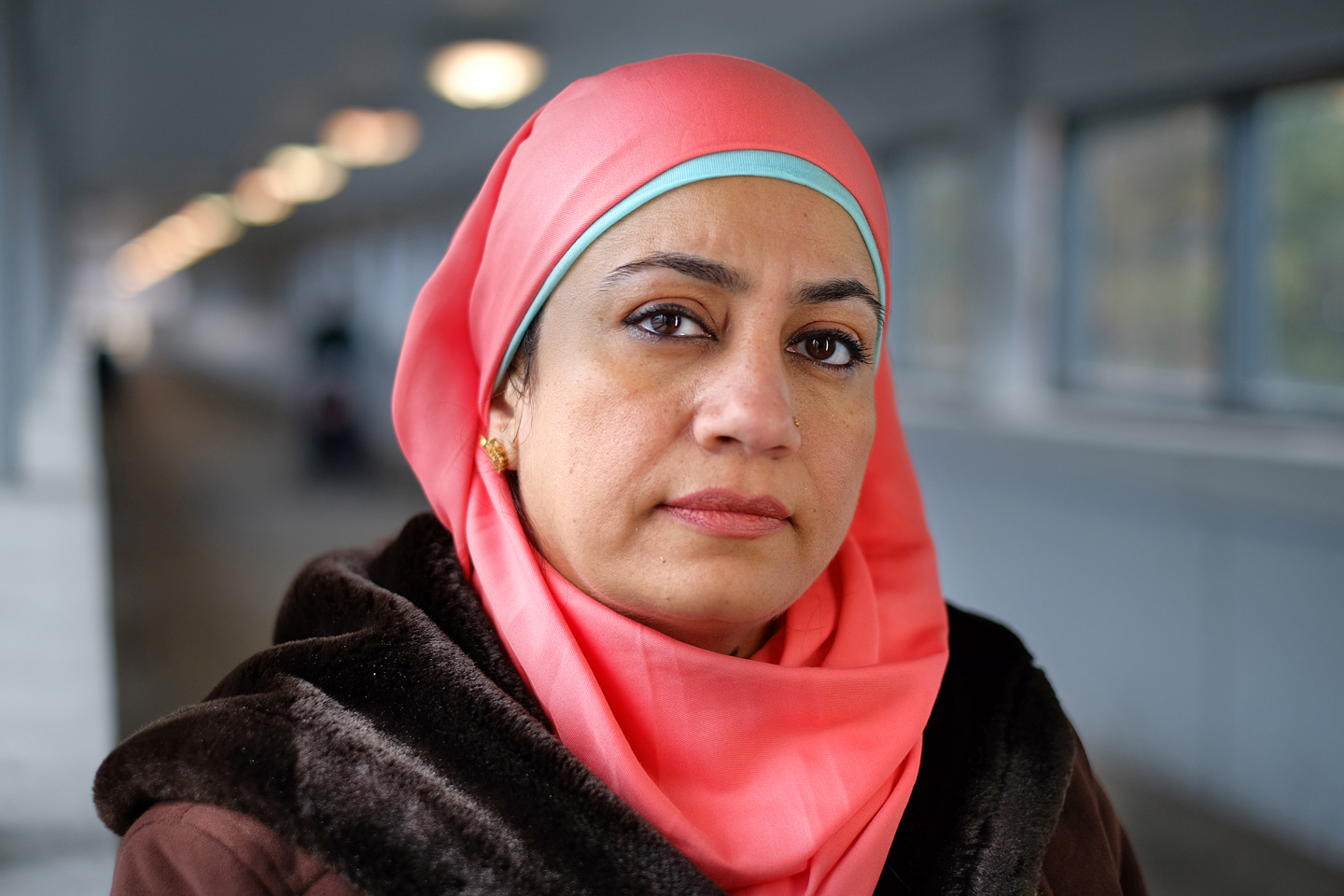Women Speak Out
From The Margins To LeadershipVoices from the Street and Women Speak Out: People remaking their lives and advocating for their communities
By Leslie Scrivener
Photography: Spencer Wynn
Mike Creek
Mike Creek
Mike Creek had held down good jobs and was proud of his work ethic. When he became poor, he became an expert on living in poverty. He had a recipe for hotdogs. Mike boiled them to make a broth and then added ketchup from packets he’d get at a fast food restaurant to make a soup. Or he’d cut them up and add them to pasta for a casserole. It was a luxury to eat a hotdog whole. He also ate mustard sandwiches, and he knew where to salvage cigarette butts. After a single night in a men’s shelter where the beds were extremely close and people were using drugs, he fled to one of Toronto’s ravines, where he lived for a while. He hardly recognized the person he’d become. Mike had worked full-time at a hotel in his hometown on Lake Erie since he was 13. By working hard he could afford the clothes he wanted and school trips to London, Paris and Morocco. He worked his way up from bus boy to management. In his early 30s, Mike moved to Vancouver, where he became a sales manager for a video reproduction company. He’d been in his new job only three months when he felt a pain in his side. It was caused by non Hodgkin’s lymphoma.
He was treated with chemotherapy and, though the cancer went into remission, he was too weak to work. Mike’s slide into poverty was like a creeping disease. He had savings to keep him going for a while. He came to Toronto, where he lived with a partner who turned out to be abusive. Mike was beaten down. And he felt he’d lost all hope of returning to the life he’d once known. He was too poor to go out with friends for a cup of coffee or to see a movie. His teeth were bad and he was embarrassed about his appearance. “I’d lost confidence that I was capable of doing anything. This is where I belonged: in the muck of poverty.” Mike says being poor was more difficult than cancer. It was corrosive. He believes if he had stayed on Ontario Disability Support much longer, his spirit would have withered and died. In 2007, Mike saw an ad at his doctor’s office for a new program called Voices from the Street. It was an invitation to people who had known poverty through homelessness, mental illness, immigration or domestic violence. Mike applied, got an interview and was given a place in the program. His life changed again. Mike is now Director of Strategic Initiatives at Working for Change, the umbrella organization for Voices from the Street. Every line in his extensive resume speaks of accomplishment. He was co-chair of Ontario’s 25 in 5 Network for Poverty Reduction (its goal was a 25 per cent reduction in poverty in five years). He’s met with provincial cabinet ministers and had the private phone number of one of them. He wrote an opinion piece in the Toronto Star. He’s been on the Board of Directors of the Canadian National Anti-Poverty Organization and the Social Planning Council of Toronto, won awards and influenced public policy. Mike has flourished. The man a social worker predicted “would never work again” is a skilled leader in human rights, health and poverty reduction campaigns. Voices from the Street is a leadership academy—it’s been called a boot camp—for public speaking and advocacy. Its goal is to empower people living in poverty and conditioned to feel helpless to become leaders in their communities, to join and influence boards and to speak before government and other agencies with the voice of “lived experience.” They tell their life stories—the micro—to reveal what works and doesn’t work in the policies and programs—the macro—designed to serve them. In 2011, Voices from the Street developed a sister program, Women Speak Out, with similar objectives, but whose members are all women. Graduates from both programs become ambassadors for their neighbours and peers, influencing public policy and changing how services are delivered. In public discussions about poverty, their voices are at the centre. They smash stereotypes about being poor. They lift veils. Their mantra is “nothing about us without us.” They are like seedpods bursting with new life, sowing a message of social change. Heather MacVicar, the former General Manager of the City of Toronto’s Employment and Social Services, says Voices from the Street is “revolutionary” for introducing people with lived experience, the ones who actually use social services, into its delivery and training system. The program’s strength isn’t simply in getting people to tell their stories, but also in urging them to link their experiences to the wider system. “It’s one of the most creative and inventive programs I’ve seen in 40 years of working in social service.” Voices from the Street was born of the conviction of four Toronto women who had worked for decades as front-line workers, researchers and trainers in mental health, housing and anti-poverty programs. It began in 2005 as a pilot project of Working for Change (formerly the Ontario Council of Alternative Businesses), which develops cafés and gardening companies run by psychiatric survivors, and the Gerstein Crisis Centre, a mental health facility in downtown Toronto. The Atkinson Foundation funded it for four years. The four women, who called themselves the Dufflet’s group after the bakery where they held their meetings, knew many survivors had potential for more than minimum-wage jobs. They could also be educators and influencers using their experience and expertise to effect social change. When Mike Creek signed up for Voices, the non-profit and social service sectors in Ontario were in recovery mode. Under a previous Progressive Conservative government, welfare rates had been cut by 21.6 per cent, services had been slashed and housing programs had vanished. By 2007, a Liberal government was in power, but it was hobbled by the losses of the previous decades. The housing crisis continued to worsen—a dire situation that continues to this day. A recent report indicates that if there isn’t immediate and significant change, Toronto will have to close 7,500 social housing units by 2023 because they will not be fit to live in. Ninety per cent will be in poor or critical condition. In 2005, the social assistance system was creaking along, but there was no engagement of people in the community, no recognition of their skills, no inclusion of them in policy discussions. They were being served, but not supported. Mike Creek says that while he was on benefits, not one worker asked him, “What can you do with your life? Can you work one day a week? How can you move forward?” He adds that “the system gives up and it’s easier to just write a cheque.” Members of the first Voices from the Street group all came from the psychiatric survivor community. What made the program different from others was that the focus was on life through the lens of poverty, not psychiatry. About 100 applied and 14 were chosen. All showed high potential and were proud they were selected. For some it was their first success in years. The program was demanding for people who had been sidelined and become used to living in a world of reduced expectations. Everyone had to be on time and attend from 10 a.m. to 3 p.m., three days a week, for 12 weeks. No excuses. They were served a substantial lunch—hot meals such as lamb curry—and given a transit pass for three months and a $60-a-week honorarium. This sent the immediate message that members were valued. They met in a large workroom at the Parkdale Activity-Recreation Centre (PARC), located in a high-immigrant, low-income neighbourhood in Toronto. PARC is a nexus for creative anti-poverty programs, often geared to psychiatric survivors. Pat Capponi, a legendary writer and social activist in Toronto, led the first sessions. She opened with a series of questions to get people thinking about how they got where they were and who they were:
- When was the first time I found myself on the street?
- When was the first time I realized my life wasn’t going where I’d hoped?
- When was the first time I ran out of food?
The questions helped connect members of the group. This bonding became more powerful in the groups that followed the first, because members were drawn from a more diverse community, one that better reflected Toronto’s population. They included refugees, people who had been homeless, isolated immigrants and women who had known domestic violence or were living with disabilities. Part of the selection process was identifying who would best benefit personally and who would be most able to give back to their community. Capponi observed that they all shared “that bone-deep fatigue that is poverty’s legacy.” Hearing each other’s stories, they understood at a deeper level the roots and different paths that led to poverty. They heard what it was like when Wheel-Trans didn’t come on time for a person in a wheelchair. Or what it was like to be targeted as a gay woman in Africa. Or about the despair of living in a shelter as a woman whose spouse had beaten her. They were surprised that despite their differences, many shared the same frustrations with social services. (“Caseworkers talk down to you, too?”) Members discovered they could speak not only for themselves, but also for their new friends. It was the first step toward leadership. In 2011, Voices from the Street developed a program specifically for women, partnering with Sistering, the Barbra Schlifer Clinic (both organizations that support women) and the Mennonite New Life Centre. Women Speak Out, funded by Status of Women Canada, uses Voices’ leadership-training model but examines immigration, homelessness, violence, health and other issues from a women’s perspective. The strength of the program, and part of its success, is the way the group leaders draw out personal stories and hone them into sharp narratives. As they listen to life stories, participants focus on their peers—the me-to-we transformation—and see the strengths that allowed others to survive. They learn they have the capacity to effect change. A first step could be feeling more confident in dealing with a landlord. A second step could be challenging broader systemic problems. The leaders who guide them through these steps have credibility, because some have faced the same challenges as members of the group. As Capponi says, they have moved out of the world of Money Marts, homeless drop-ins, food banks and some of Toronto’s worst housing into a new world where they are empowered, drive cars, buy condos and raise the children they’ve won back from the Children’s Aid Society. Together they examine the systems—social services or mental health—that have served or not served them very well. They are asked to take responsibility for their own bad decisions, but also to critically examine failures in public policy. Moving on through the 12 weeks, members learn about advocacy, domestic violence, women’s rights, how to speak to the media, diversity and how the government’s poverty and income security files work. How do decisions get made in government? What is the difference between a civil servant and political staff? (John Stapleton, who worked for the Ontario government for 28 years and was research director for a task force on income security, teaches this section.) Pat Capponi’s question is: how can you fix something if you don’t know how it works? Newcomers are surprised to learn that Canada has its own history of oppression— in residential schools, for example—or that it wasn’t until 1981 that it became illegal for a man to rape his wife. Diversity training, which takes up six classes, is a core component. Graduates of the program have come from 22 countries. They learn the effects of racism on mental health, employment and assimilation. Many have never been exposed to sexual diversity. One of the facilitators, who is deeply committed to women’s equality, wears a hijab and brings firsthand experience as an immigrant from a traditional Muslim culture. At the end of the program, participants are given a certificate and celebrate with a buffet lunch. Their graduating speeches, which are persuasive and poignant calls for change, are often given in Council Chambers at Toronto’s City Hall. “I hope someone powerful will see past my physical limitations,” Catherine Girard, who uses a wheelchair, said in her graduation speech. “Please remember I am a person, just like everyone else in this room. “ Pedro Barata, Vice-President of Communications at United Way Toronto, calls Voices from the Street “one of the most important anti-poverty stories of the last decade.” Its members are key contributors to social assistance reforms that provincial working groups and commissions have focused on since 2008. Graduates of Voices from the Street were leaders in the 25 in 5 Network for Poverty Reduction. Pat Capponi, Mike Creek and others met with provincial ministers of health, community and social services, and children and youth services, as well as their deputies. It was historic, the first time people with lived experience were formally invited to present their case and be recognized as valuable sources of information. These anti-poverty activists were not disruptive adversaries but respected collaborators helping reform policy and find a path through the labyrinth of social assistance, with its 800 or so rules. “We had known that social assistance was complicated, so hearing from a group like Voices from the Street helped to clarify what the impact was on individuals,” says Tatum Wilson, now a senior advisor on health policy to the Ontario premier. Voices soon started doing its own research. In partnership with the Daily Bread Food Bank, it trained peer researchers—people with lived experience—to conduct a social assistance review. The result was the People’s Blueprint, a report that included video interviews explaining the barriers and challenges in the system and proposed a way forward based on principles of dignity and personal advancement. Because the People’s Blueprint had been so effective, Voices from the Street was invited to make a presentation to the Social Assistance Review Commission (led by Frances Lankin and Munir Sheikh) which, in its 2012 report, called for a simpler, more accountable and opportunity-rich program to support people on social assistance. Voices was a major contributor to changes to the clawback rule, so that people on social assistance could keep $200 in earned income before deductions were taken from their benefit cheques. Other reforms that came, in part, through the leadership of people with lived experience included increases in what people were allowed to have as assets and other savings, easing rules to allow friends and families to give Ontario Works’ recipients casual gifts, and the expansion of dental and medical benefits for low-income families with children. Members of Voices from the Street continue to sit on provincial advisory councils. “I doubt the poverty reduction strategy would have happened without Voices from the Street,” says the United Way’s Pedro Barata. At the City of Toronto, which employs some 2,000 people in social services and job finding, members of Voices from the Street were invited to speak to new frontline caseworkers about how the system works and how the rules affect them. Now these meetings are a formal part of caseworkers’ training. “That had not been done before,” says Heather MacVicar, the former General Manager. Furthermore, when the city introduced debit cards to replace mailed social assistance cheques, the clients themselves were consulted, chose the card’s design and vetted the rollout strategy for the new program. “This says, ‘Not only do I have value, but I have a contribution to make to the kind of services I receive,’” notes MacVicar. “It puts people on a level playing field. And that’s what is revolutionary.” MacVicar brought these client advisory groups into the social service system. “Once it was established and my staff started hearing from them, it changed their way of thinking.” The change was effective in small ways: “Just the way people are treated when they come into the office. You can be efficient and businesslike, but can still be demeaning.” Some caseworkers don’t offer their names when working with a client but identify themselves by a number. “How do you engage someone on a human level?” MacVicar asks. “Voices from the Street and Women Speak Out contributed to that more humanizing environment.” Voices and Women Speak Out have also influenced the way doctors respond to patients who are mentally ill or living in poverty. After hearing a speech by a graduate of Voices from the Street, a group of psychiatry residents organized a meeting with psychiatric survivors. They said they had never heard in their university lectures the kinds of things the speaker told them—how frightened homeless people are when they go to hospital emergency departments, for example. This meeting led to a group known as the Residents and Consumers Initiative. They meet once a month over dinner at the home of a psychiatry resident or consumer/ survivor, a daring way of breaking down barriers between professional and client. Now input from psychiatric survivors/consumers is integrated into the University of Toronto’s psychiatry curriculum. Voices has also worked with police and made a video in which people arrested under the Mental Health Act describe the triggers that worsen these encounters. They advise how to cool down difficult situations. About 5,000 police see the film each year. Voices and Women Speak Out participants joined citizens groups who successfully lobbied against expanding police use of Tasers. An unexpected outcome of both Voices from the Street and Women Speak Out is the members’ eagerness to work. Voices’ leadership training—with its peer modelling, personal encouragement and positive group dynamic—has proven to be a winning formula. For some, the course is pre-employment training. With renewed self-esteem, men and women are more ready to test the job market or go to school. Lubna Khalid, Women Speak Out’s coordinator and a graduate of the program, has stayed connected to its 65 graduates. She sends them for further training (food handling, hostel management, CPR, community workshops and sometimes university courses). She guides them through job applications and helps them prepare for interviews even years after their graduation. The program is also flexible and can be adapted to participants’ interests. When members of one session expressed interest in learning to be peer support workers, organizers introduced a special training component. Because participants have lived experience, they often have skills to help people navigate mental health centres, hospitals and community agencies. It’s expected that there will be more jobs for peer support workers opening up in Ontario. Terence Williams has seen the benefits of peer work as he as put his life back together. Born in South Africa, raised in England and Canada, Terence moved to the U.S., where he joined the military and worked for 10 years. Back in Canada in 1982, Terence fell into depression and endured periods of debilitating anxiety that required hospitalization. Later, he lived in shelters and was occasionally jailed for public mischief. He connected with PARC and Voices from the Street. Now he works as both a community support worker and a housing support worker. Terence was a keynote speaker at a University of Ottawa conference on homelessness. “I’ve proved you can make a comeback,” says the 64-year-old. “You can make another life, not quite the same as before, but a meaningful life.” When men and women graduate from the two programs, they scatter across the city, speaking at universities, unions, food banks, mental health organizations and conferences, Rotary Clubs and nursing associations. They talk about their lives and how government policy affects them. They have given hundreds of speeches and spoken to thousands of people. Voices from the Street and Women Speak Out are important, too, in the current climate, where funding to advocacy groups is being eroded and voices that challenge the system are silenced. The ripple effect is far-reaching, like seeds that are borne on the wind, settle and take root. After a 2012 Women Speak Out program (sessions are held once or twice a year, depending on funding, and cost about $40,000 each to present), eight participants had on-call or part-time work and 10 were enrolled in preemployment training at a city-run program. Graduates who are not ready to work say they now more involved in their communities. They are volunteering at seniors clubs, community gardens, women’s crisis centres and food banks. Even though reports at the end of the program are glowing, they still don’t fully capture the pleasure people find in their own learning, says Barbara Williams, an independent consultant who did a three-year evaluation of Women Speak Out, called Roots to Women’s Leadership and Empowerment, for Status of Women Canada. Women who have taken the program report enhanced levels of self-esteem, which is a predictor of many changes in women’s lives. As the Voices from the Street and Women Speak Out models become known, other groups have shown interest in using their curriculum. A women’s group called Power Up in Saint John tailored the model for an empowerment and job-readiness training program in their city. The next step for Women Speak Out is to create a leadership training guide that can be adapted to the different needs of women’s groups throughout Canada. Wherever the program is implemented, five practices make up its core: anti-oppression education, asset-mapping and goal-setting, storytelling for social change, community education for policy change, and mentoring. The Women Speak Out model has gone international, too, as staff members have spoken about the program at conferences in Rio de Janeiro, Istanbul and Quito. In 2013, Women Speak Out won the Women Transforming Cities best practices award. As Barbara Williams noted in her report, “Women Speak Out has become the go-to program for social agencies interested in hearing directly from women living in poverty about their lived experiences…and the public policies that affect them.” Three graduates of the programs now have jobs at Working for Change. Mike Creek is one of them, along with Dawnmarie Harriott and Lubna Khalid. When Mike finished the program, he kept coming back to the office. He knew that work gave purpose to people’s lives. He wanted to keep learning. At first he came to do research and learn how to use the Internet. One day staff asked him to do some filing. When an employee left her position, Mike was hired to take her place. In the process, he became a committed advocate for social change. As he says, it’s people like him, who have gone hungry and lived in inadequate housing, who must be part of any conversation about getting “things fixed.” He adds: “I feel I am making changes. I may be one person, but it takes time to build a better world.”
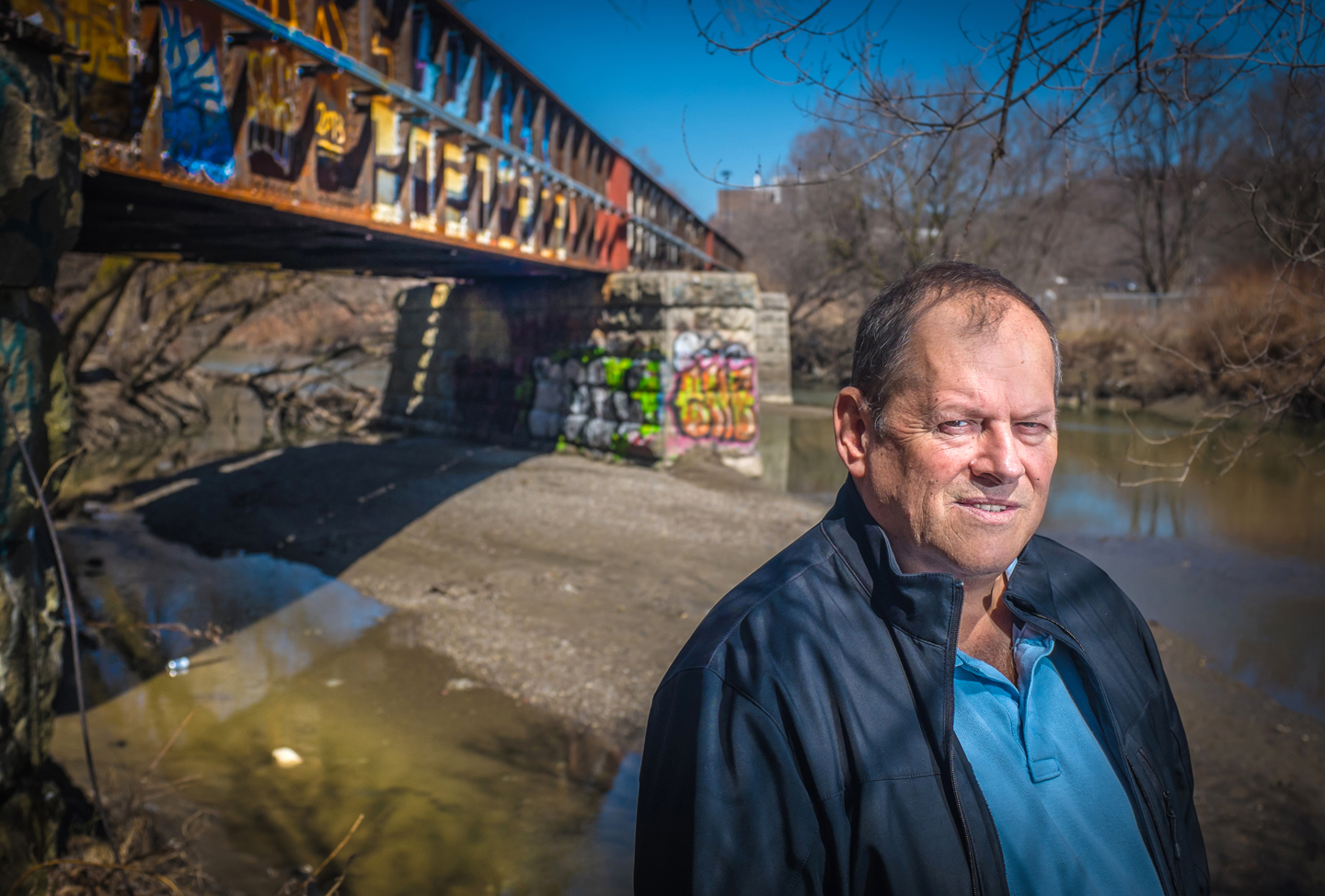
Acsana Fernando
Acsana Fernando
Dreams awakened at Women Speak Out, she advocates for the poor and is studying to be a social service worker. Acsana Fernando knew, even as a 10-year-old, that someday she would be forced to flee Bangladesh. Her mother was Catholic, her father Muslim, and the intolerance toward a mixed marriage was unbearably high. A street thug took an interest in her when she was 21 and vowed to make her his fourth wife. She refused. He retaliated by smearing her reputation and breaking into her parents’ house by gunpoint. He said he would return to rape her. Acsana’s father sold what he could to pay for her ticket to New York City. A courier accompanied her and put her on a bus to Buffalo, N.Y. She carried only a small backpack with a few shirts and a photograph of her family. Workers at a Buffalo shelter arranged for her transport by bus to Toronto. Acsana, who blindly followed their instructions, was never told where she was going. Though she was totally alone, “I had no fear,” she says. Acsana’s single goal was to be reunited with her family. As a penniless refugee, she needed the help of settlement workers, legal aid lawyers and others. It was confusing trying to figure out the labyrinth of agencies. She did learn she had to earn $56,000 a year to sponsor her family. She was working three jobs: midnight to 8 a.m. at a factory, noon to 9 p.m. at a call centre and part-time as a security guard on weekends. Though she had a rented room, she often slept in her car. In 2003, the family home in Bangladesh was attacked and her mother was burned alive. No one was ever charged with the crime. Acsana succeeded in bringing her father and brother to Canada. They shared a one-bedroom apartment where she slept on the floor. When her brother was struck with a debilitating neurological disorder, Acsana reluctantly sought financial help from Ontario Works so she could care for her family. She had to choose between buying a Metro pass or medical supplies for her ailing father. She paid his transit fare to his appointments but went on foot herself to meet him. Sometimes she’d walk 13 kilometres a day. Her father was shocked when she revealed the true reason she didn’t accompany him on transit. “He couldn’t believe poverty had so strong an impact, even in Canada.” At Women Speak Out, her dreams were awakened: she is now studying to be a social service worker. And she became an advocate in media interviews, using her experiences as a springboard for a wider discussion of poverty, precarious employment and refugee needs. She serves on the boards of Working for Change and the Workers’ Action Centre. She’s advocated at the Ontario premier’s office, before members of provincial parliament and the provincial labour minister for improvements to the minimum wage. When her Toronto Community Housing manager didn’t respond to her request for repairs, she went to a columnist from the Toronto Star and within three days the work was done. “That told me it’s not what you know, it’s who you know. But what about people, newcomers, who don’t know who to ask? That’s taken me 13 years of living in Canada.” Acsana is now studying at George Brown College. She works 48 hours a week at a group home. Her wage is $17 an hour, but she receives only $11 (the rest goes to an agency) because she’s been told she lacks Canadian credentials. She’s vocal about that injustice, too. “Women Speak Out,” she declares, “made me understand I have this ability.”
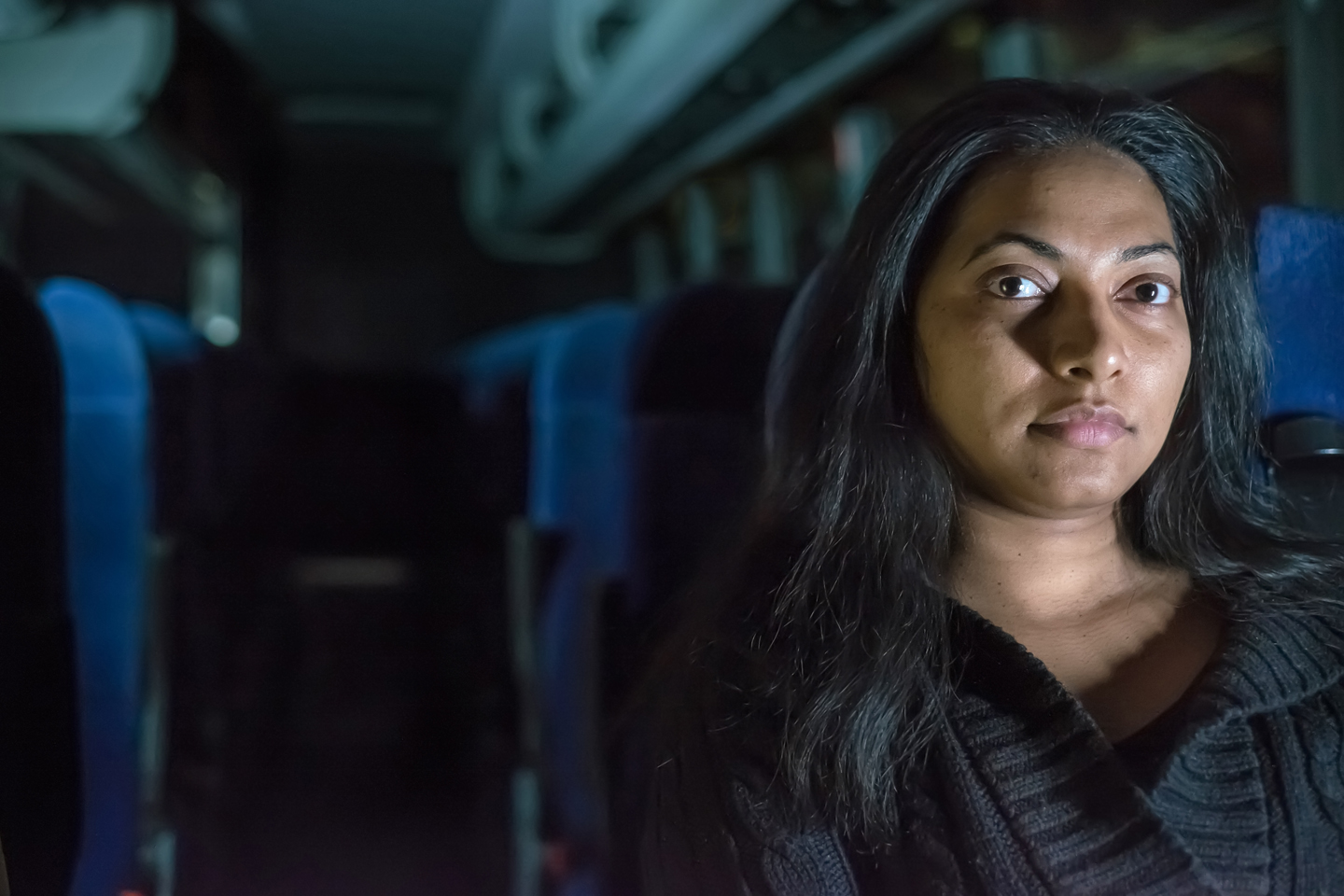
Stacey Bowen
Stacey Bowen
Voices helped Stacey end her 18-year drug addiction, and now she advocates for others The turning point for Stacey Bowen came when she tiptoed into her little daughters’ bedroom to kiss them goodnight and one asked: “What’s wrong with you?” Stacey believed she had hidden her drug habit, a scourge on her life before they were born, from them. If her children didn’t know the specifics, they sensed something was amiss. “There is this moment of clarity when you really see what your life is,” she says of her 18-year habit. “I was trying to protect my children and it turned out I was the enemy. I broke down.” An irrepressible woman, Stacey tells her story fearlessly. How she babysat the neighbours’ kids and was paid in crack. How she spent her student loan money on crack. How she had to move out of her neighbourhood because the dealers were too enticing. How she went to rehab three times. Finally, she attended Voices from the Street. “It made me look at myself as a whole being. You have to be honest or you will fail.” She returned to her childhood love of writing stories. At the beginning of the program it was all “me, me, me.” But Pat Capponi, one of the group facilitators, led her from “me to we”. She saw how everyone in the group had a painful past. This deepening empathy was key to learning to advocate for others. What skills could she bring to an organization? “I learned I could talk and I had important viewpoints.” She earned a diploma in counselling from George Brown College, which hangs on the dining room wall in her co-op town house, where she lives with her now-grown daughters. Stacey has lectured at a drug treatment centre she once attended. She sits on four advisory panels and committees, at hospitals and community health centres. She’s worked as an addictions counsellor and is on a task force for the Dream Team (a supportive housing group), through which she speaks to corporate leaders about the benefits of hiring people with mental health issues. Next: she’s about to start a job as a shelter worker at the Fred Victor Centre, a social service provider. She wants to spread the word about the value of people like her who have “lived experience… “When I was growing up I saw the government as a machine with people in suits up here and I was down here. I’m going through all these experiences and they are making decisions for me. How do they know what I need? We need to bring me up and you need to come down. We need to meet.”
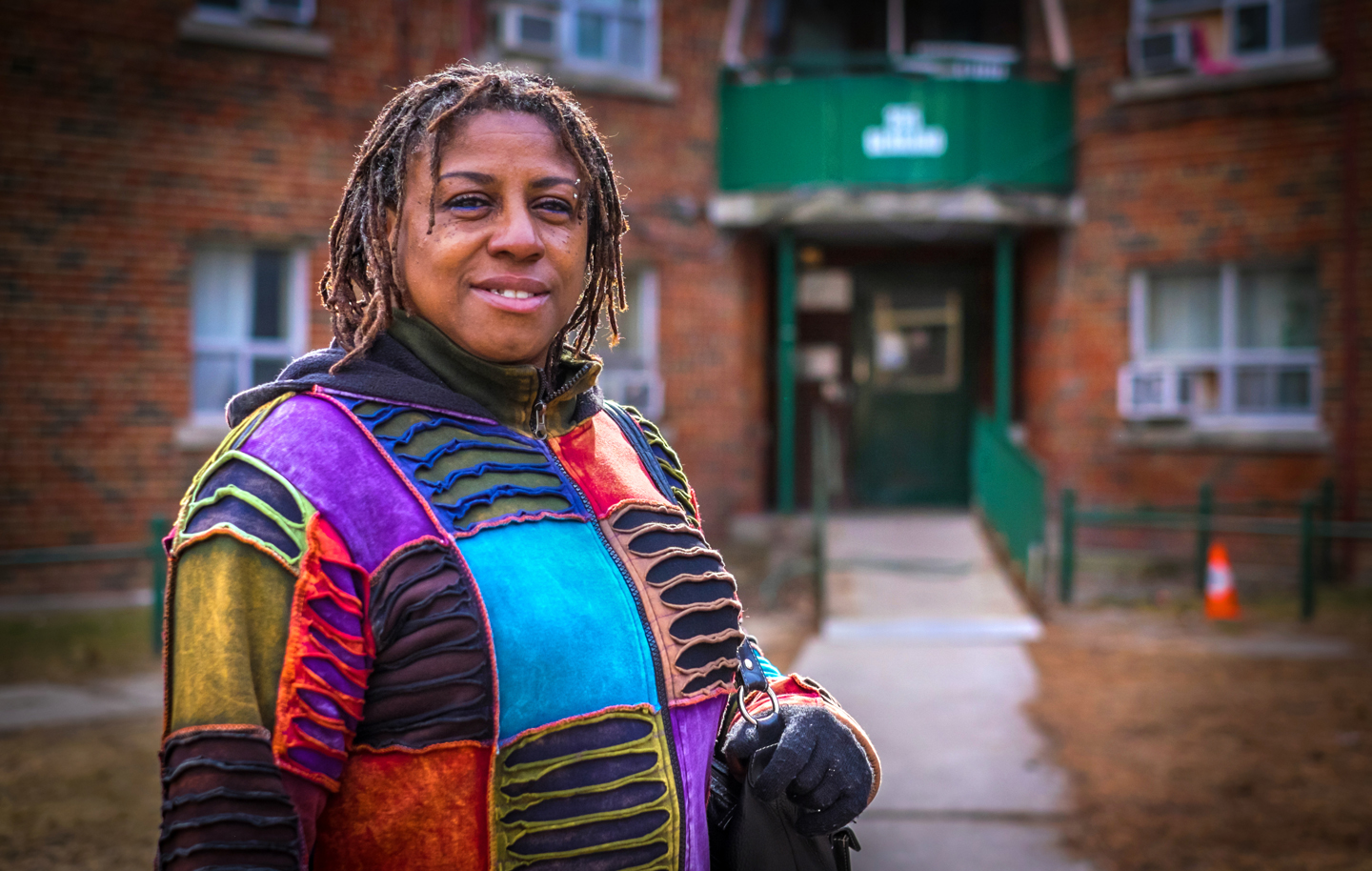
Madona Broderick
Madona Broderick
Addiction and sex work for 23 years, then a new life At 21, Madonna Broderick had a good life. She was married with two children and had a job as a law clerk. But it all changed when her husband, who was her childhood sweetheart, became violent. Madonna had a breakdown. At a party she had her first hit of crack cocaine. “My chest puffed out,” she remembers. “I was free of fear. I could do anything.” Crack cocaine became the driver in her life— her first thought when she woke up, her last at night. She slept on a park bench to keep tabs on drug dealers arriving at a local bar. Her parents took her children. She sold everything, became a sex worker and was jailed on prostitution and drug charges. The years passed. A tree near the bench was only a few feet tall when she started sleeping there. Now, she observes, the tree towers over her. “It was fine when you’re young and pretty and you’re making a ton of money…But the streets are cruel.” She lived this life for 23 years—until Oct 28, 2000, when she woke up on the same park bench in Toronto’s west end, wet, cold and suicidal. She was 44 years old. She couldn’t find a dealer. A friend who had overcome his addiction offered to take her to detox. He’d be back in an hour. Serendipitously, he pulled up just as her dealer arrived. She chose a new life. “Even if it wasn’t a miracle,” she says, “it felt like it.” The following year, Madonna asked her social worker to help her seek funding to further her education. The worker replied, “In my experience, recovering addicts do not complete anything they start.” Madonna wondered how many others she had stolen dreams from. She sharpened her resolve, went to college and graduated from a business program with honours. Madonna worked in job training and became a role model (health issues now prevent her from working full-time). Her apartment, a cosy nest with walls the colour of chocolate milk, deep red sofas and the glow of an artificial fire, reflects how much she has changed. Under her clock hang the letters of the word “HOPE”. Who would know better than Madonna about hope? Since joining Women Speak Out, where she was trained in public speaking, she has told her story at hospitals, drop-in and treatment centres and medical schools with the goal of improving services to the homeless. She urges medical practitioners to actively listen when someone with an addiction comes to the hospital. Don’t “look down” on addicts or ask them to leave if they are in pain, she counsels. After speaking at a Montessori school, she received letters from Grade 7 students. “You put me in your shoes,” one wrote. “Now I have a different view of homeless people…” “Thank you for making us aware,” wrote another. Speaking at a drop-in, Madonna saw in the crowd someone from her past, who was surprised to see her thriving. “She didn’t think it was possible. I think she saw hope. I was a bad addict. I was violent, and I believe she thought if I could do it, she could do it.” Madonna spends a lot of time with her four grandchildren. It’s a way of making amends for abandoning her two daughters. “I may not be able to fix the damage done,” she says, “but I can still make a difference in my relationship with their children. I’m paying it forward.”
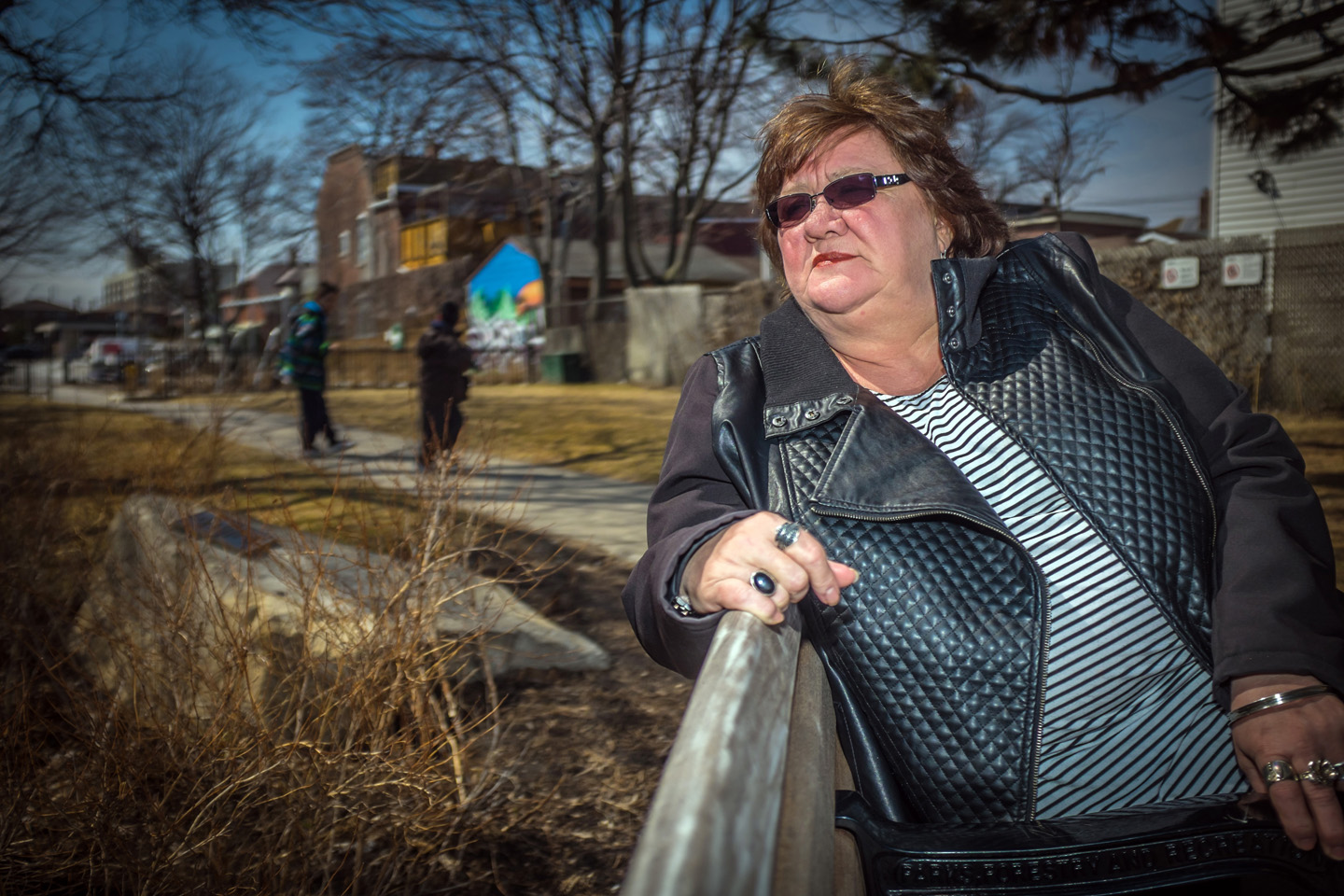
Junic Wokuri
Junic Wokuri
Junic Wokuri is a refugee from Uganda. In Canada she was profoundly lonely, depressed and broke; she relied on the generosity of a few friends. She felt guilty leaving her life as an activist and her partner. A nurse by training—she was at the top of her graduating class—Junic says it’s been complicated and expensive getting her credentials recognized in Canada. So far, she’s spent $400—a lot on her minimal Ontario Works income—and is not finished the process. “It feels like an eternity,” she says. “I have all this knowledge. I am trained, but I cannot work here as a nurse until I fulfill all the requirements.” Women Speak Out became part of her healing. “It helped connect me to people who were not in the same situation, but had similar experiences with poverty, mental health issues and addictions. I was drinking a lot. It was like my friend.” She learned about conflict resolution and how to sharpen her public speaking skills. “When we started sharing stories it was overwhelming. I looked at all these women from different backgrounds but it seemed we were all connected. We’d all had experiences of discrimination and feeling left out. At first I felt, why me? But when I learned that other people had similar experiences, that emotional baggage was lessened.” The problems were systemic, not just personal. Junic’s face lights up as she recalls the three-month transit pass she was given while on the course. “The sense of freedom I had—I could just hop on the train and go all the way to Finch Ave. and walk around and come back home. And free food! Who does that? People who care about others.” She’s been invited to speak about the challenges facing foreign-trained nurses to the Ontario Nurses’ Association and the Ontario Federation of Labour, and she has been a community animator for the City of Toronto’s Poverty Reduction Strategy. Junic is slowly acquiring the Canadian work experience many employers demand: she was hired as a relief worker at a local community centre.
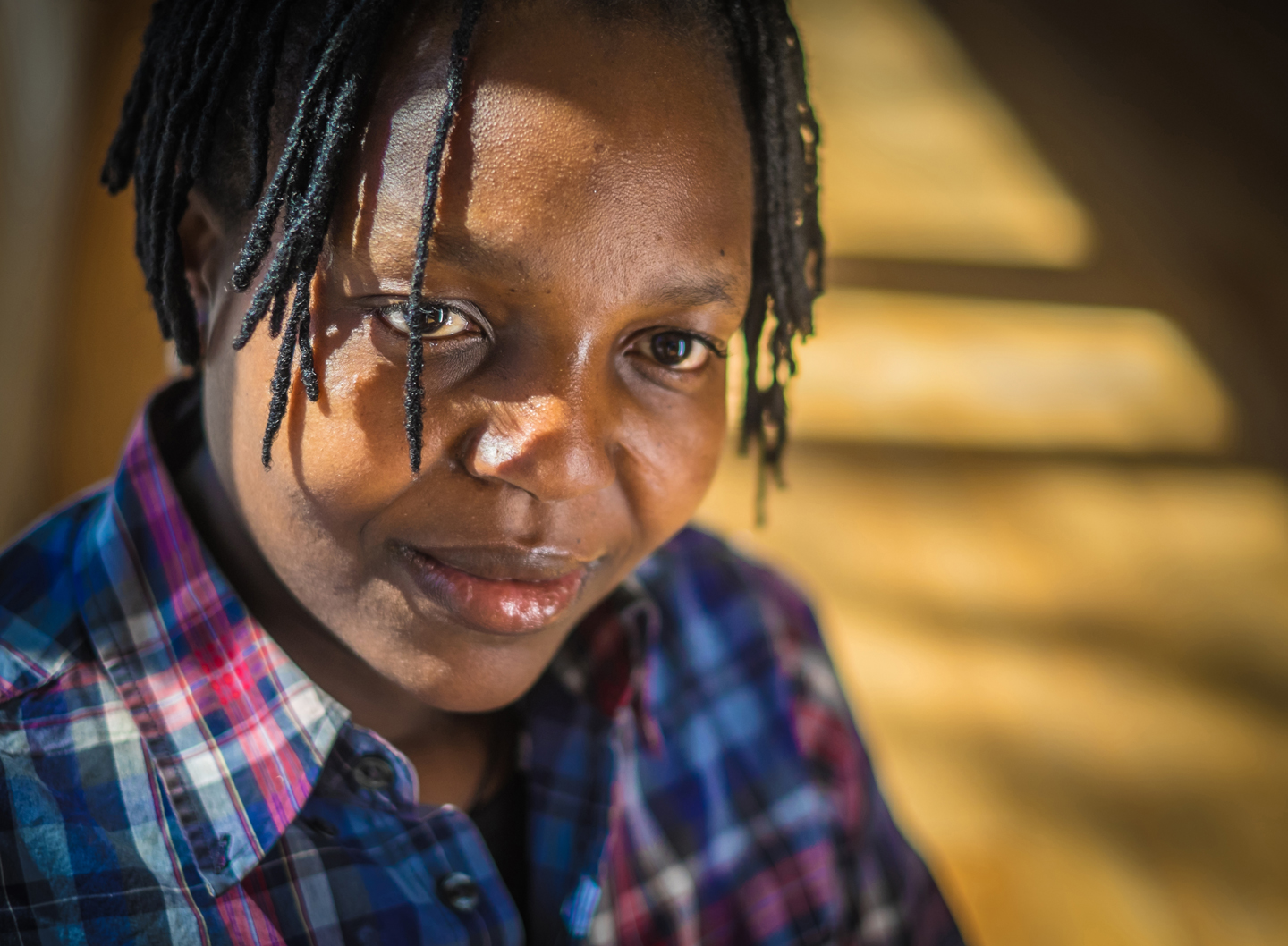
Dawnmarie Hariott
Dawnmarie Harriott
She learned to stop blaming herself, and to speak publicly about abuse and custody issues There was so much anxiety going around in my head,” Dawnmarie Harriott recalls of her childhood. “I didn’t know what to say to people. I was terrified.” She arrived in Toronto from Jamaica a malnourished four-year-old, having been separated for three years from a distracted mother who was working to establish herself in Canada. Neglected and often punished, she escaped into books, reading Nancy Drew mysteries and The Chronicles of Narnia. When she ran out of books, she read the encyclopedia or the Bible. At 13, Dawnmarie was sexually assaulted by a classmate. She had her first baby, a daughter, at 20 with a man who became abusive. She left him. She eventually found work in call centres. Thriving in her new career, she was earning a $50,000 a year and owned a car. She was starting to blossom. Dawnmarie had a son with her second partner, who seemed smitten with her. It took time for him to reveal himself as a stalker and an abuser. “That’s how they work. They treat you so well, you think no one has ever loved you that much.” Life started unravelling. She fled to a shelter, then returned to her partner, and when he became extremely violent, she defended herself. “I guess I fought a little too hard, because I spent three months in jail.” She never went back, but she lost her son, her job and her car. The struggle to reclaim her child involved both the Children’s Aid Society and social assistance. The two systems seemed at cross-purposes and nearly defeated her. She needed a two-bedroom apartment to house her son, but couldn’t get money from Ontario Works to pay for it until her son was living with her. “They need to work together to ensure a person’s success in their community,” she says. Like others who have lived in shelters and struggled with substance use as a means of coping, Dawnmarie felt shame and guilt. “It’s not that we are not intelligent or not trying enough to get ahead.” At Voices from the Street she found the encouragement she’d never had as a child. “With education we learned that these were systemic problems, not just our own lives, and when we saw that, we became empowered to make change.” She gave speeches at shelters, focusing on domestic violence, and to policy-makers— including the Ontario Minister of Child and Youth Services—about the catch-22 she’d endured in regaining custody. Housing agencies and shelters were shocked to hear how policies worked against each other. “With every speech I was terrified, but every time I did it, I felt accomplished. I felt self-esteem building. I wanted to help others with similar experiences.” Because of the abuse she endured as a teenager and adult, she wants to help other women be safe. Dawnmarie has been a consultant on a Canadian Safe School Network DVD called “Where’s Your Line?” for girls at risk of sexual assault, and she’s shared her story on a documentary called Survivor’s Guide to Freedom from Violence. Dawnmarie’s work trajectory has been one of stability and growth: she held several jobs at Working for Change before becoming coordinator of Voices from the Street. “I am happy now. My children are educated and moving forward. I have a career that I love and can be proud of and where I can use my past to support others on their journey.” Her daughter is in her last year of university and her son is about to start college. “I feel I’ve made it. I wanted to regain what I’d lost. I have come back and surpassed that.”
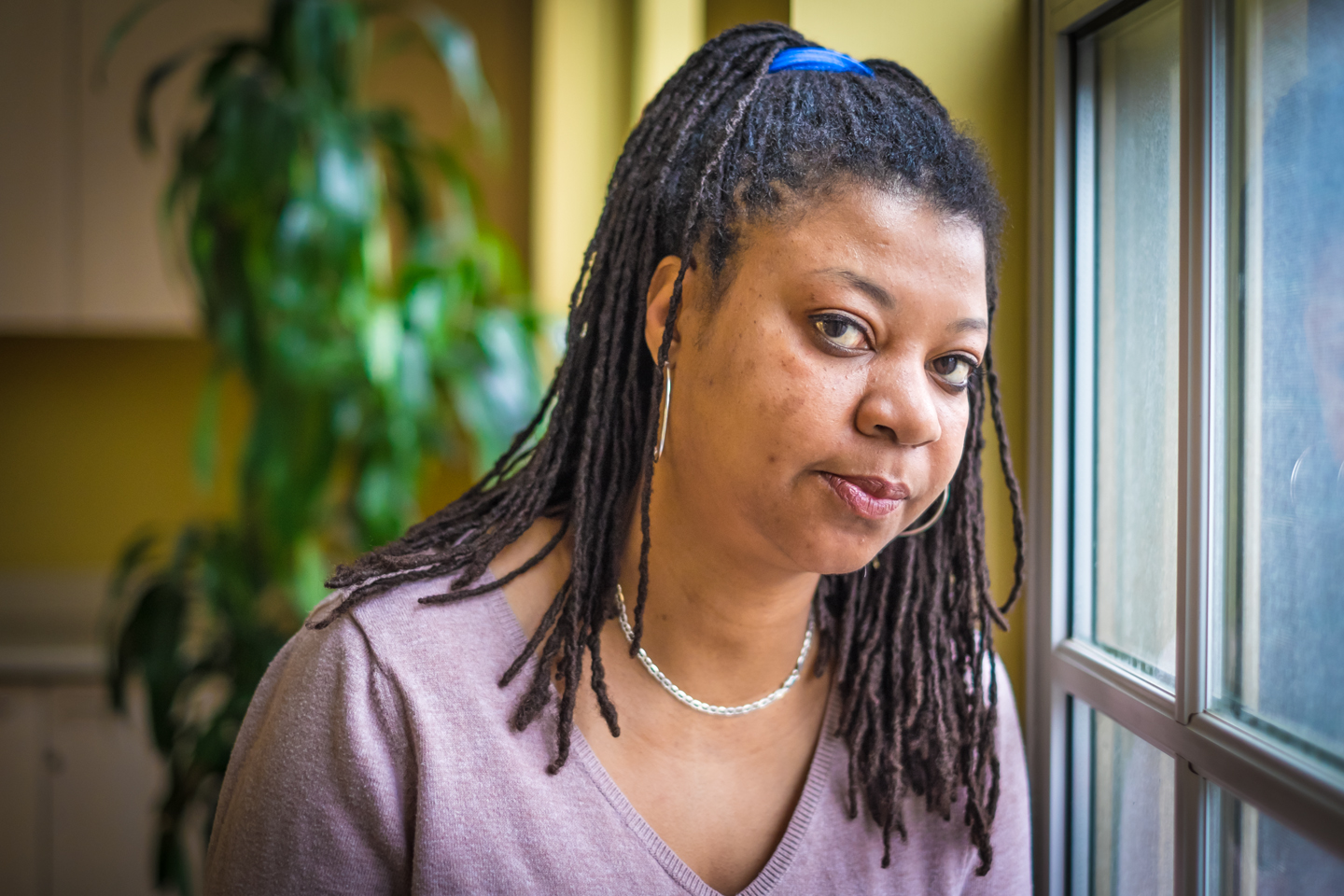
Lubna Khalid
Lubna Khalid
The Women Speak Out coordinator helps grads years after they complete the program After she came to Canada from Pakistan as a young bride in an arranged marriage, Lubna Khalid had three children in quick succession and stayed at home to look after them. The isolation and boredom weighed on her. She had an agile mind and a master’s degree in physiology. She longed for a sense of purpose. “In our culture men provide and women stay home. That’s all our women were doing, despite being well-educated. “ To help other newcomers from South Asia, Lubna organized a weekly women’s group to share talents and understand life in their new county. Their meetings ranged from doing handicrafts to having discussions about the Canadian educational system. When her youngest child started school, it was time to get back to work. Lubna wanted to enroll in university but had to prove she had Grade 12 math and English. She took an assessment exam and scored at the highest level. But she was told that because she was overqualified, she could not take the course required to get her high school equivalency diploma. She did win admission to a special speakers bureau for immigrants organized by the Mennonite New Life Centre and Voices. It broadened her view and gave her deeper insight into life in her new home. “I thought there was no poverty here. In the media everyone in the U.S. or Canada is so rich and happy.” She was in tears watching a film about an impoverished woman who collected pennies to treat herself to something she considered a luxury: a coffee! “How ashamed I felt. This is out there and I was blind.” Lubna is now the coordinator for Women Speak Out. She uses the lens of her own experience to talk about women’s empowerment at conferences in Peru and Turkey, where she’s met other leaders of grassroots development projects around the world. She’s consulted with women’s groups in Pakistan who want to pilot a leadership training course similar to Women Speak Out. At a symposium on gender and work at the Harvard Business School, Lubna’s was a powerful voice illuminating the restricted lives of Muslim women who marry into traditional families. “Most of the time you are not allowed to bring your ‘old self’ in the new home, you just have to start from scratch. “Because of my non-traditional upbringing I was always in an internal conflict. My fight was against the customs and traditions practised in the name of religion (as it was) interpreted in our daily life. I was against the inequity of gender imposed in the name of religion.” Years after women graduate from the program, Lubna stays connected to them, not only offering counselling and referrals but also using her contacts to help with housing, new jobs and public speaking. She feels like one of them. “It could be me,” she says. “If I can, I will do anything.”
